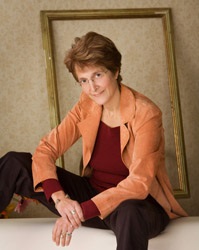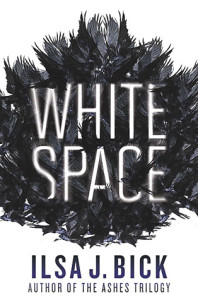Ilsa J. Bick Talks with Roger
Talks with Roger is a sponsored supplement to our free monthly e-newsletter, Notes from the Horn Book.

Talks with Roger is a sponsored supplement to our free monthly e-newsletter, Notes from the Horn Book. To receive Notes, sign up here.
Sponsored by![]()
 After wrapping up the apocalyptic Ashes trilogy with Monsters last fall, Ilsa J. Bick returns with White Space, a fat thriller that finds its chills in the unlikely intersections of dreams, lives, and books as young people with latent extrasensory abilities find themselves colliding (sometimes literally!) with one another's stories and darkest imaginings.
After wrapping up the apocalyptic Ashes trilogy with Monsters last fall, Ilsa J. Bick returns with White Space, a fat thriller that finds its chills in the unlikely intersections of dreams, lives, and books as young people with latent extrasensory abilities find themselves colliding (sometimes literally!) with one another's stories and darkest imaginings.Roger Sutton: I have always believed that my dreams are in some sense true, and your new book, White Space, has made me scared.
Ilsa J. Bick: Good. It did its job. Yay!
RS: How much of this do you believe?
IJB: That's a tough question, because remember, you're talking to a shrink. I'm old enough that I did the whole Freudian thing. I stared at acoustical tiles in my analyst's office for years as I recounted my dreams and free-associated. Dreams are your brain's way of trying to catalogue your memories and experiences and relating them to who you are. So in terms of the truth that they can tell you about yourself, your dreams have as much validity as anything you might say. And sometimes I think they're actually truer than you think, because when you're dreaming you're not applying a lot of conscious control. The only thing that protects you in a dream is you'll wake up before the monster kills you.
RS: But you don't generally know that while you're dreaming.
IJB: Exactly right. It's like they say in Inception (only I think Freud said it first): you don't know a dream until you realize you've been asleep. But then even when you wake up, how do you know that's really waking? I certainly have had the experience of thinking that I'm awake, only to realize that I'm now in a second or a third dream. It's a very freaky experience because you have this moment of jolting awake and thinking "is this real?" Everything I write in a book I believe at the moment that I'm writing it. So sure, I think dreams are true.
RS: I think as far as our brains are concerned, or our souls, depending on how far you want to go with this, writing, like dreaming, like reading — those things do happen to us. If you dream you're being chased by an ax murderer, you have the experience of being chased by an ax murderer.
IJB: I've always been interested in the breakdown in what we call reality. When I was in forensic psychiatry, for example, I’d talk with different people about the same incident. Everybody's recollection of what they think is real was colored by who they are.
Often I would see kids who'd say, "I'm not sure if what I'm talking about or what I'm feeling is my idea or my parents'." Like when somebody says, "I've always wanted to be a doctor." Whose idea was that? Was that really yours, when you were eight or whatever, or was it something that your parents suggested, and then through repetition it becomes yours? And so then what is your reality? Is it only what's constructed by your parents? Kids are intensely interested in that sort of thing, even if they can't quite say it that way. They wonder, "How am I separate from my parents?" And they want to be separate from their parents, but they're also terrifically frightened about being separate from their parents. That's why dystopias work so well for adolescents. Whether parents like it or not, all kids live under dystopian regimes. They're called parents and school. And kids just can't wait to break free. It's a necessary task of adolescence. But in fact breaking free is also really, really frightening.
RS: Why do you think it's only in the last ten years or so that dystopia has become such a hot topic in books for teenagers? Do they know something we don't?
IJB: I don't think kids know anything we don't know. I really don't know why there's an explosion in the literature now, except that kids keep reading it. Part of me thinks it's going to then move to the next thing, because how many messed-up societies can you find? Now on the other hand, the reality is that the sort of righting the dystopian wrongs of the parents is, as I said, part of adolescence anyway. Go out, find love interests, destroy your parents' world, build your own world, and start your own family. But thank god there are, what, 200,000 books published in the United States a year? And not all of them are dystopias.
 RS: One thing that's really different about White Space — and there are a lot of things that are different about it, but as an artifact of publishing — is that if you think back to young adult literature even fifteen, twenty years ago, you'd never be able to publish a book this long.
RS: One thing that's really different about White Space — and there are a lot of things that are different about it, but as an artifact of publishing — is that if you think back to young adult literature even fifteen, twenty years ago, you'd never be able to publish a book this long.IJB: I guess you're right. I keep thinking, "Well, tell that to J.K. Rowling."
RS: She's to blame.
IJB: In fact, the first version I turned in for White Space was 150 pages shorter, because I was worried about length. And my editor came back and said, "I'm kind of wondering about this and this and this," and those are all the things that I had cut out. So I put them back in, and wrote in even more, and he said, "This is the story it has to be." So I've been very fortunate with my editors. I also think back to my own reading — I mean, let's face it: Dune was a monster of a book. But I read it. And I didn't even think about the fact that it's thick. In fact, if anything, having a longer book meant I could have more fun for a longer period of time.
RS: And Dune — I think a lot of the appeal there, like the Lord of the Rings books, was that it created this world that you wanted to be in. So the longer the better.
IJB: Exactly right. Some reviews look at length as something that is bad. This brick of a book, or Gee, it's kind of long. I say, "And? And?"
RS: But some books are long for the sake of being long. I can think of fantasy novels where the feisty heroine and her friends are on their horses, and they have to cross a country to get to their goal. Fine. So they have an encounter with this monster. They have an encounter with that monster. They have an encounter with this other monster. Really you just needed one of those.
IJB: The second Lord of the Rings movie seemed to be the actors running from one side of the picture to the other, repetitively. I do have a confession. I have never read the Lord of the Rings books. That type of fantasy has never appealed to me. I liked the movies okay, but never read the books. I've never been a big fantasy buff.
RS: You seem to have a darker imagination than those books would feed.
IJB: Yes. My dad is a Holocaust survivor. He lost his entire family in Auschwitz. He was seven or eight when the Nazis came knocking at his door. It's not something he talks about, it’s this kind of void. When I was younger, he used to tell me, "You need to know how to protect yourself. You need to always be watching out," conditioned by his past. This is a guy who still, when he eats, puts his arm up to guard his food. He's a traumatized guy. I read a fair number of concentration camp memoirs and things like that when I was younger. It's not just me imagining, it's me knowing all the evil that the world is very capable of. So it's hard for me to think of writing a light romance, for example. Or a fantasy novel where everything ends with a kiss. Or where there are little trolls running around. I think it's probably the old saw about shrinks: you're either really, really normal, so that you know troubled people when you see them, or it takes one to know one. I have a good sense of humor, but my writing is dark.
RS: I saw on your website you quoted another writer who taught you to "try something new with every book." What would you try? What's next for you?
IJB: Right now I'm in the beginning throes of writing a standalone. How do you talk about victimization in a way that isn't weepy or angry? After that I have another standalone that's actually more of a murder mystery. I'd like to actually see if I can pull off a murder mystery with no woo-woo.
RS: I taught a class in book reviewing this semester, and one of the assignments was for each of the students to read and review a book in a genre that they detested. Someone said, you know, "I hate chick lit." So someone else in the class who loves chick lit said, "You've got to read…" and then she recommended, I think, a Sophie Kinsella book. It was very interesting to make people confront these genres that they hated.
IJB: I remember this one writers' workshop I went to. It was a two-week-long we're-going-to-tear-you-down-and-then-build-you-up-again thing. I just want to say shrinks and surgeons have nothing on writers when they're tearing you apart. The floor was bloody. They made us read a bunch of things before we came, and one of them was a Nora Roberts book. God, gag me with a fork. I thought I would die. But in fact it ended up not being such a terrible book, although I got really pissed off that everyone was a size four and wore strappy sandals without breaking their ankles.
RS: What books scare you?
IJB: None. That's kind of a problem for me. I actually haven't read a book yet that really scared me. I don't know what it is, but I don't get scared. I might get grossed out… There have been some books that I think "ew," but then I think, "That's a nice effect. I'm going to write that down."
RS: Do you ever get scared when you're writing?
IJB: Nope. I don't get scared when I'm writing either. Scary movies also don't bother me. Except Alien, a movie that did scare my pants off and made my date scream like a little girl. But no, books don't scare me. Not even the ones I write. Which is unfortunate but true.
More on Ilsa J. Bick from The Horn Book
Sponsored by![]()
RELATED
RECOMMENDED
ALREADY A SUBSCRIBER? LOG IN
We are currently offering this content for free. Sign up now to activate your personal profile, where you can save articles for future viewing.







Add Comment :-
Be the first reader to comment.
Comment Policy: